The Golden Dawn or Thoth Method
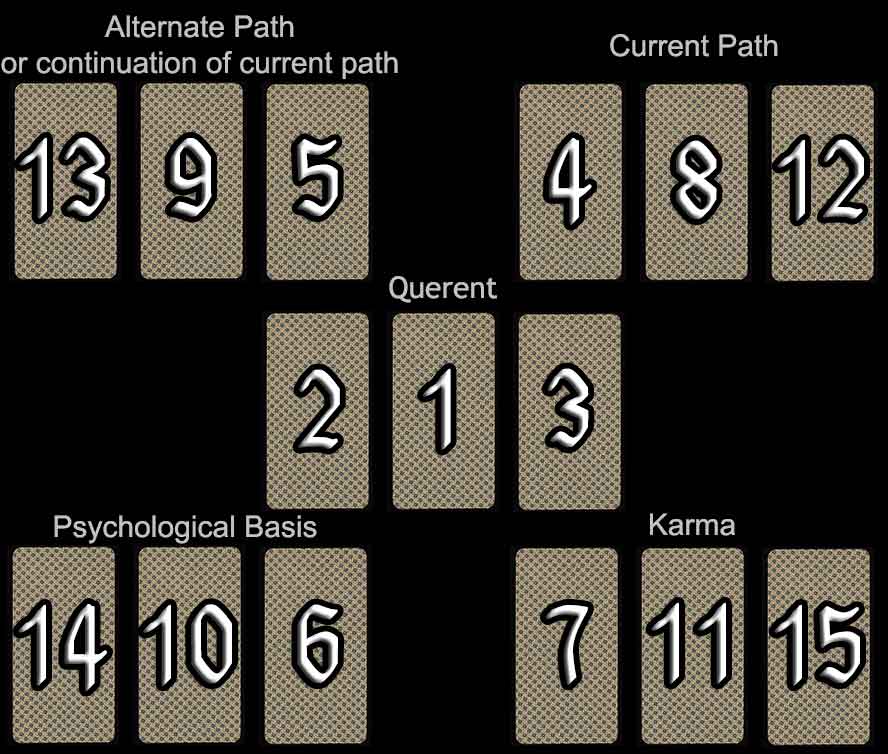
Difficulty: Complicated
Note: Tarot decks that use reversed cards such as the Rider-Waite do not work well with this spread, which was designed to be read using elemental dignity.
The Golden Dawn spread is best suited for use with the bifrost Tarot and especially the Book of Thoth, as these decks are meant to be read a certain way with the court cards. Princes and queens represent actual men and women connected with the matter, while princesses generally represent ideas; thoughts or opinions, and knights represent arrival or departure of a matter depending on the direction faced.
In this tarot spread, particular attention should be paid to a card's exact position in relation to its neighbours. Whether the neighbour cards bear the same energy (suit) determines whether a card is considered well-dignified or ill-dignified. Opposite suits ill-dignify each other, while other suits are considered friendly. Tarot cards of the same suit or element strengthen each other.
As with other tarot spreads, it is important to count the cards' tendencies, such as whether there is a lot of one particular suit or number pattern. The patterns reveal special messages. Having several majors present indicates higher forces at work, several cups suggest strong emotions, etc.
Card #1 represents the reader and the nature of the topic at hand.
Cards #2 & #3 are read in extension of #1 to further comprehend the nature of the topic.
The two sets of three tarot cards at the top of the spread represent chronological sets of events. The current path as it would unfold naturally is represented by cards #4, #8, & #12. The alternate path that could be taken is represented by cards #13, #9, & #5. However, if the reader gets the feeling these cards are telling them they go together, then the alternate path is to be considered an extension of the current path, and to be read chronologically in this order: #4, #8, #12, #13, #9, #5. Just keep in mind: this is only if the two paths seem particularly similar.
Cards #14, #10, & #6 shed light upon the psychological undertones of the current issue.
Cards #7, #11, & #15 represent the influences of karma and destiny beyond the reader's control. These cards suggest adapting to this, as fate.
Your Golden Dawn Reading
| The Alternate Path (or Extension of Current Path) |
Your Current Path |
|||||
Eight of Batons |
King of Cups |
XVI – The Tower (La Maison Dieu) |
XV – The Devil (Le Diable) |
Deuce of Coins |
King of Batons |
|
| The Querent | ||||||
VII – The Chariot |
Four of Cups |
Ace of Coins |
||||
| The Psychological Basis | Karma | |||||
Ace of Swords |
Queen of Batons |
XXI – The World (Le Monde) |
VIII – Justice |
Five of Cups |
Ace of Cups |
|
The Querent
cards represent the querent and the nature of the topic at hand. The first card (in the center of the spread) represents the very core of the matter, and the other two cards around it are added to it in order to further comprehend the nature of the topic.
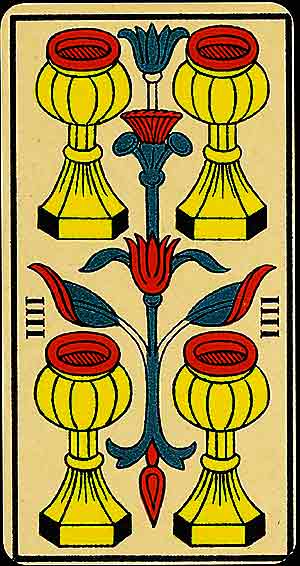
The Four of Cups signifies a moment of refined contemplation, a pause to appreciate the richness present while considering what more could enhance emotional fulfillment. It suggests a life abundant in comforts yet calling for deeper engagement to rediscover true pleasure.
Symbolism: Four cups form a balanced and harmonious structure, symbolising emotional stability and refined satisfaction. Their symmetry suggests a state of ease but also the potential for indulgence to lead to complacency. The imagery encourages a conscious appreciation of luxury and the pursuit of deeper emotional refinement.
In Relationships: A period of emotional contentment that may lead to a desire for something more profound. This is a time to rekindle passion, indulge in shared pleasures, and cultivate the richness of connection.
In Work: A phase of stability and success where motivation must now be fueled by inspiration rather than necessity. Seek new heights of creative fulfilment and elevate your ambitions beyond the merely comfortable.
Spiritually: The card calls for a refined awareness of the beauty and abundance in life. It encourages gratitude, mindfulness, and the pursuit of deeper emotional and spiritual fulfilment beyond material satisfaction.
When ill-dignified: Overindulgence, boredom, or taking things for granted. It warns against becoming too accustomed to comfort and missing the opportunity to elevate life to an even greater level of richness.
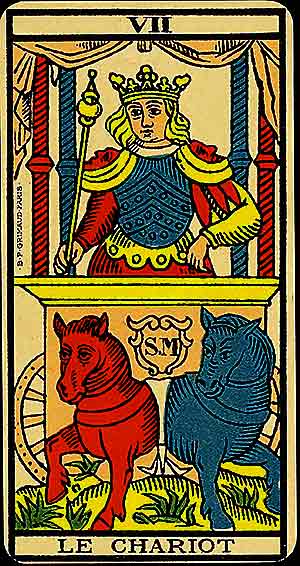
The Chariot represents triumph through willpower and discipline. It is the card of focused determination, suggesting the mastery of opposing forces to achieve a unified goal.
Symbolism: The charioteer stands tall, guiding two horses of contrasting colours, symbolising duality and control. The canopy above him evokes divine protection, while the wheels in motion reflect progress and momentum. His expression is resolute, embodying control amidst dynamic movement.
In Relationships: Moving forward together, overcoming challenges, or achieving harmony despite differences.
In Work: Success through focus, persistence, and strategic action. Victory is attainable through balance and self-control.
Spiritually: The Chariot teaches the alignment of inner and outer forces, calling for the integration of spirit and will to advance.
When ill-dignified: Lack of direction, recklessness, or internal conflict. It warns against being pulled in opposing directions without clarity of purpose.
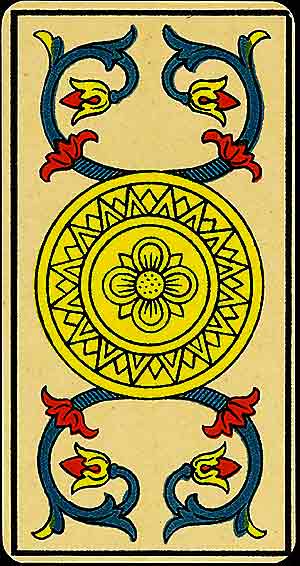
The Ace of Coins symbolises the pure essence of material abundance, stability, and potential. It represents the seed of prosperity and the opportunity to build a strong foundation for success.
Symbolism: A single coin stands at the centre, adorned with floral motifs and a rectangular border. Its design reflects wealth and harmony, suggesting that prosperity is aligned with natural order and balance.
In Relationships: A grounded and stable beginning where trust and security are prioritised.
In Work: A promising opportunity or new venture in the material realm, offering long-term potential for success.
Spiritually: The card reflects alignment with earthly abundance and the ability to manifest your spiritual aspirations in tangible ways.
When ill-dignified: Missed opportunities, greed, or focusing only on material gain. It warns against neglecting deeper values in pursuit of wealth.
Your Current Path
cards represent your current path as it would unfold naturally. These cards are read in chronological order from left to right.
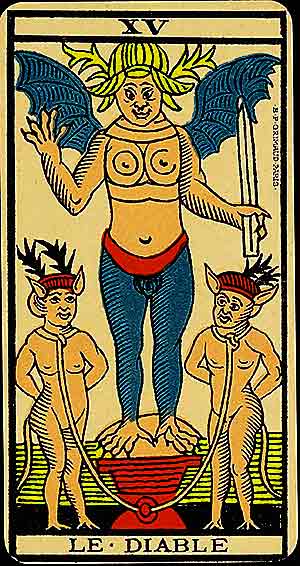
The Devil represents temptation, materialism, and the power of the shadow self. While it warns of unhealthy attachments, it also offers an opportunity to confront and integrate the darker aspects of human nature.
Symbolism: A horned figure dominates the scene, with two smaller chained figures below, symbolising bondage to desires or fears. The loose chains suggest that this bondage is self-imposed and can be escaped. The card's imagery reflects both the allure and consequences of indulgence.
In Relationships: Obsessive or co-dependent relationships. It may indicate intense passion or unhealthy dynamics.
In Work: Temptation to take shortcuts or pursue goals at the expense of ethics. A need to reassess priorities.
Spiritually: The Devil challenges you to confront your shadow self and transform fears into liberation.
When ill-dignified: Escapism, addiction, or manipulative behaviours. It warns of being trapped in destructive patterns.
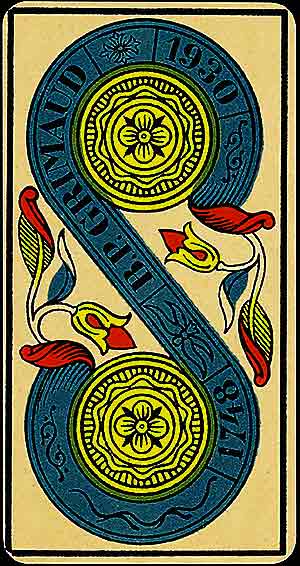
The Deuce of Coins represents balance, adaptability, and the management of priorities. It highlights the flow and rhythm of practical matters.
Symbolism: A blue ribbon bearing the name B.P. Grimaud links two coins, symbolising the interplay between dual forces. The design reflects the need for equilibrium and flexibility in navigating change.
In Relationships: Finding a balance between personal and shared responsibilities.
In Work: Juggling tasks or managing resources effectively. It encourages adaptability in the face of change.
Spiritually: The card represents the balance between spiritual and material pursuits, urging the seeker to maintain harmony.
When ill-dignified: Instability, over-commitment, or neglecting one priority in favour of another. It warns against losing balance in your endeavours.
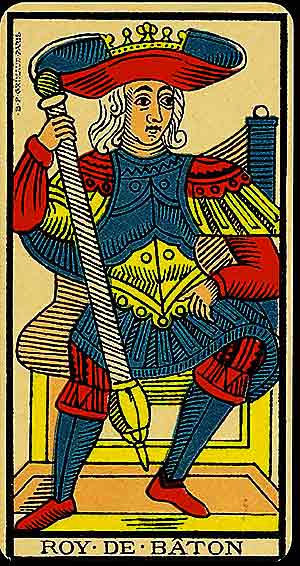
The King of Batons signifies visionary leadership, mastery of creative energy, and the courage to inspire and guide others. This card represents the fulfilment of ambitions through determination and integrity.
Symbolism: Seated on a throne as a symbol of power and growth, the King holds his baton with authority, exuding confidence. His posture reflects a deep understanding of his role as a leader and creator.
In Relationships: It represents a strong, passionate partnership built on mutual respect and shared goals. The card encourages leading with strength and understanding.
In Work: The King symbolises ambition fulfilled through visionary action, inspiring others, and maintaining integrity. It encourages bold decision-making and confidence in your abilities.
Spiritually: The King reflects mastery of inner fire, urging the seeker to channel their spiritual energy into meaningful action and purpose.
When ill-dignified: Tyranny, arrogance, or a lack of empathy. It warns against using power selfishly or losing sight of the collaborative spirit of true leadership.
The Alternate Path
cards represent the alternate path that you could choose to take in lieu of the Current Path. However, if the cards that come up seem to indicate that they go along with the Current Path, these three cards should be interpretted not as an Alternate Path, but as a chronological extension of the Current Path (also read from left to right).
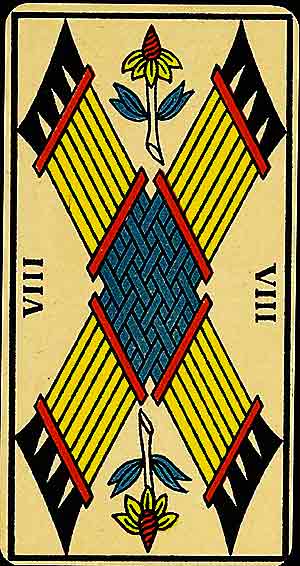
The Eight of Batons symbolises rapid progress, momentum, and swift resolution. It encourages focus and decisiveness to make the most of opportunities.
Symbolism: Eight batons align dynamically, creating a sense of motion and direction. The flowers sprouting atop the batons reflect the energy of growth propelled forward rapidly.
In Relationships: Fast-paced developments in relationships or sudden clarity about emotional matters.
In Work: Momentum builds as goals approach completion. This is a time for decisive action.
Spiritually: The card reflects accelerated growth and alignment with a higher purpose. Trust the flow of events.
When ill-dignified: Chaos, missed opportunities, or rushing without purpose. It warns against letting haste lead to mistakes.
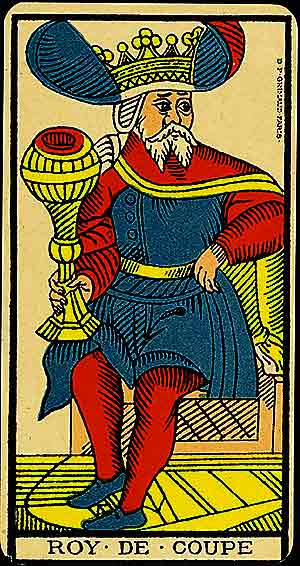
The King of Cups represents emotional balance, wisdom, and leadership. He embodies the ability to guide others with kindness and understanding while maintaining his own emotional stability.
Symbolism: Seated on his throne with a serene expression, the King holds a cup, symbolising emotional authority. The structure around him reflects his connection to intuition and emotional balance.
In Relationships: This card signifies a stable and emotionally mature partner or dynamic. It encourages fostering relationships built on mutual respect, trust, and emotional stability.
In Work: The King highlights leadership through emotional intelligence and wisdom. It suggests guiding others with compassion and remaining calm in challenging situations.
Spiritually: The King represents the harmony between intellect and emotions, urging you to channel your emotional stability into guiding yourself and others with integrity.
When ill-dignified: Emotional suppression, volatility, or manipulation. It warns against using emotional influence for selfish gain or allowing inner turbulence to disrupt your leadership.
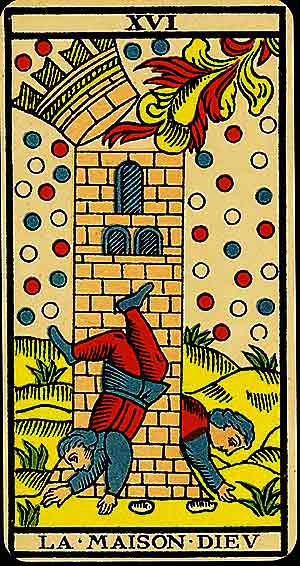
The Tower signifies sudden upheaval, revelation, and the destruction of false structures. It is a powerful reminder that chaos and doom often precede transformation and growth.
Symbolism: A tower struck by lightning blows its top as figures fall to the ground. The lightning represents divine intervention, while the tumbling balls and figures symbolise the collapse of illusions and false foundations. The falling crown signifies the downfall of pride. Despite its dramatic imagery, the card hints at liberation and renewal.
In Relationships: A dramatic change, often revealing truths that must be addressed.
In Work: Sudden challenges or shifts that dismantle old systems. It's a chance to rebuild on a stronger foundation.
Spiritually: The Tower urges the seeker to let go of illusions and embrace the profound truth revealed in moments of crisis.
When ill-dignified: Resistance to change, denial, or clinging to crumbling structures. It warns against ignoring the signs of impending transformation.
The Psychological Basis
cards shed light upon the psychological undertones of the current problem.
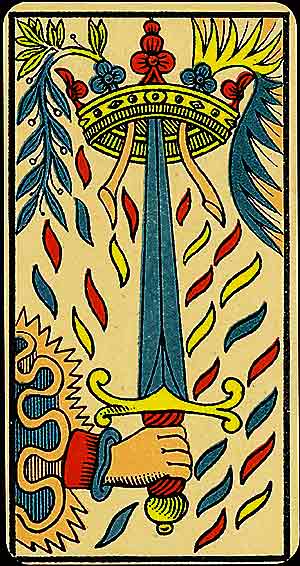
The Ace of Swords represents the pure essence of intellect, clarity, and decisive action. It signifies a breakthrough or a new beginning rooted in truth and the power of the mind.
Symbolism: A single sword rises vertically, adorned with a crown and floral motifs, symbolising victory, divine truth, and mental clarity. The upward direction penetrating the crown emphasises the potential to cut through illusions and reveal higher wisdom.
In Relationships: Clear communication paves the way for a deeper connection. It may signal the start of a relationship based on mutual understanding.
In Work: A fresh idea or decisive action propels you forward. It's a time for mental focus and setting clear goals.
Spiritually: The card reflects awakening through truth and the ability to discern the path forward with clarity.
When ill-dignified: Miscommunication, over analysis, or harsh judgements. It warns against using intellect as a weapon or avoiding necessary action.
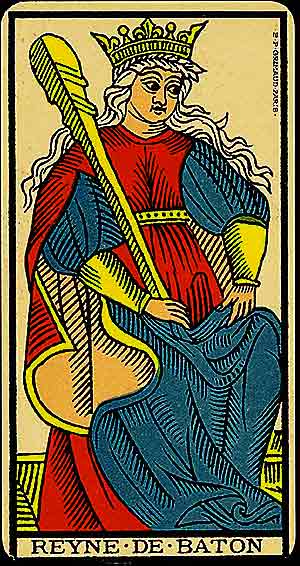
The Queen of Batons represents creative leadership, warmth, and the nurturing of ideas and relationships. She inspires confidence and demonstrates the power of blending intuition with action.
Symbolism: Seated on her throne with a commanding yet approachable presence, the Queen holds her baton with purpose. The aura of growth and vitality surrounds her, emphasising her connection to creativity and nurturing energy.
In Relationships: The card signifies loyalty, passion, and the deepening of bonds through mutual inspiration. It suggests a partner who brings warmth and confidence to the relationship.
In Work: It highlights leadership, creativity, and the ability to inspire a team or execute a vision with determination and grace.
Spiritually: The Queen calls for alignment with your inner fire, trusting your intuition to guide your creative and spiritual pursuits.
When ill-dignified: Overconfidence, manipulation, or burnout. It warns against using charm for selfish gains or losing balance in the pursuit of ambitions.
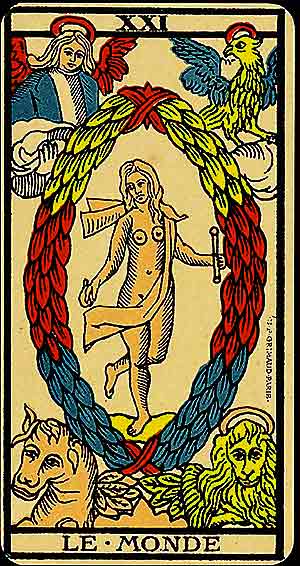
The World is the culmination of the journey, representing fulfilment, harmony, and unity. It signifies the integration of all aspects of life and the successful completion of a cycle, opening the way to new beginnings.
Symbolism: A central figure dances within a laurel wreath, symbolising victory and wholeness. The four corners often depict symbolic creatures (the lion, ox, eagle, and man), representing the elements, the fixed signs of the zodiac, or the four faces of a cherubim. The wreath signifies completion and eternity.
In Relationships: A harmonious, complete relationship or fulfilment of long-term goals in love. It reflects unity and shared purpose.
In Work: The successful culmination of a project or phase. Recognition and achievement mark this time of completion.
Spiritually: Le Monde invites the seeker to embrace the interconnectedness of all things, celebrating unity with the divine and readiness for new journeys.
When ill-dignified: Incompletion, stagnation, or feeling unfulfilled despite external success. It warns against losing sight of the bigger picture or resisting closure.
Karma
These cards represent the influences of karma and destiny that are beyond your control. They suggest adapting to this fate.
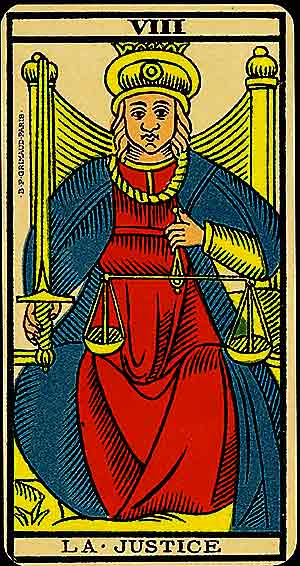
Justice signifies truth, balance, and the law of cause and effect. She represents the impartial hand of the universe, delivering outcomes that align with one's actions and intentions.
Symbolism: Seated on a throne, Justice holds scales in one hand and a sword in the other. The scales symbolise balance and fairness, while the sword represents the clarity and decisiveness required to enact justice. Her direct gaze emphasises accountability and integrity.
In Relationships: Honest communication and equitable partnerships. It calls for evaluating the fairness and balance within relationships.
In Work: Decisions made with integrity will lead to just rewards. It is a time to act ethically and weigh all options carefully.
Spiritually: Justice reflects the law of karma and encourages alignment with higher principles to achieve spiritual clarity.
When ill-dignified: Corruption, dishonesty, or imbalance. It warns against biased decisions or failure to take responsibility for your actions.
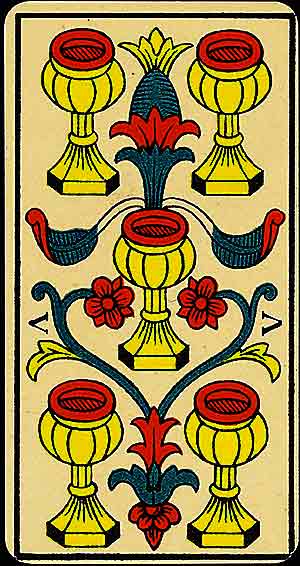
The Five of Cups symbolises loss, regret, and the emotional challenges of letting go. It speaks of the need to acknowledge grief but also to recognise the potential for healing.
Symbolism: Five cups form a crossing arrangement, with floral motifs hinting at the possibility of renewal amidst sorrow. The imbalance reflects the disruption caused by loss or disappointment.
In Relationships: Heartbreak or unresolved emotional wounds. It suggests healing and moving forward after a period of sadness.
In Work: A setback or failure that offers lessons for future growth. Focus on what remains rather than what has been lost.
Spiritually: The card reflects the transformative power of grief and the opportunity for spiritual renewal through acceptance.
When ill-dignified: Dwelling on loss, refusing to heal, or missing opportunities for renewal. It warns against letting regret dominate your outlook.
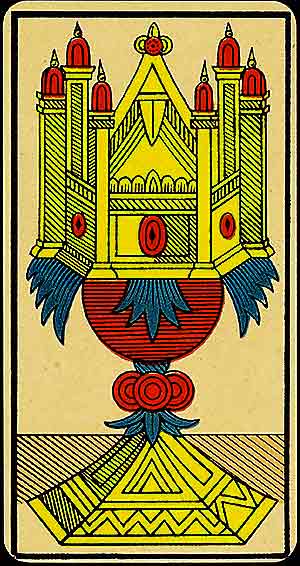
The Ace of Cups embodies the pure essence of emotional fulfilment, love, and spiritual connection. It represents the beginning of a satisfying phase in relationships, creativity, or inner growth.
Symbolism: A single chalice sits at the centre, decorated with royal motifs. The flowing embellishments signify abundance, renewal, and the divine source of emotional nourishment. The symmetry emphasises harmony and the wholeness of new beginnings.
In Relationships: The Ace heralds the start of a new relationship or the rekindling of emotional intimacy. It speaks of deep emotional connections.
In Work: A surge of inspiration or the beginning of a project that aligns with your heart's desires.
Spiritually: The card represents a divine outpouring of love and spiritual awakening, calling the seeker to open their heart to the infinite.
When ill-dignified: Emotional blocks, insincerity, or missed opportunities for connection. It warns against repressing feelings or ignoring the heart's call.